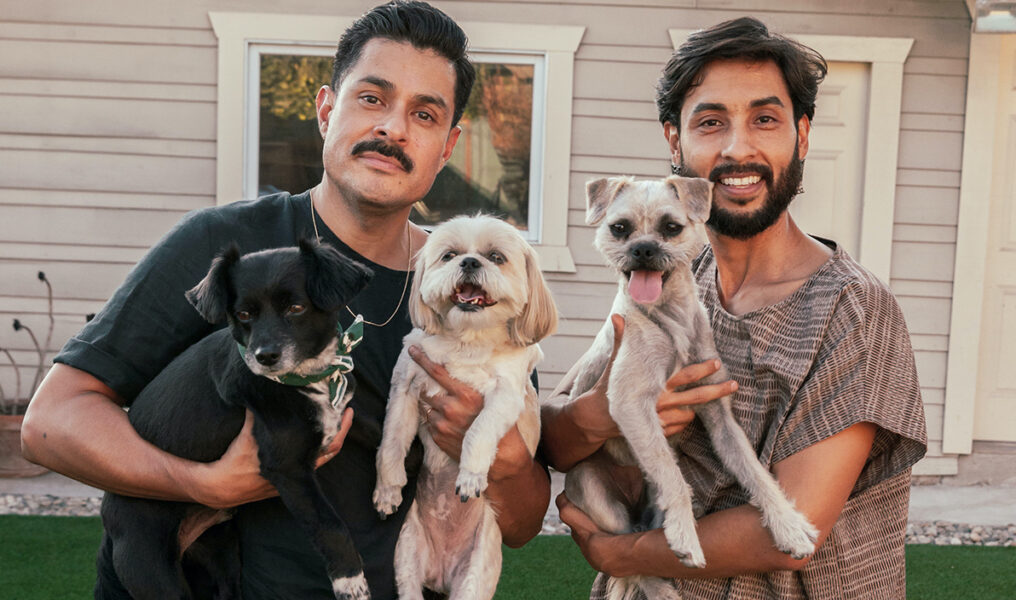For L.A.-based queer photographer Sorrell Scrutton, their dog Frankie really is their best friend. When COVID struck, Frankie helped them counter the isolation. Given their bond, Scrutton decided to reach out to other queer friends to discuss how pets can help soothe pandemic-caused mental strain. Their project "Queerantine," a queer pet owner photography series, is the result of those discussions.
"Pets have always been lifesavers, and I want to show [them] in my work as a pet photographer," Scrutton explains on their website. "My dog Frankie saved my life a year ago when I experienced a very personal and difficult time that was very isolating. Without her and the support of my community, I'm sure I would not have made it out."
Scrutton says "Queerantine" offered them an outlet to create and share queer pet relationships.
"I developed 'Queerantine' to be able to continue my practice as a photographer safely, and felt it important to document the collective queer experience of COVID-19 at the same time," they told Pride Source. "It started with friends, and once I posted on Instagram, it quickly grew on its own. I included anyone who identified anywhere on the LBGTQIA+ spectrum."
At the beginning of the project, Scrutton's goal was to create 100 images of queer pet owners alongside their pets. Since then, they've exceeded that goal — they're currently up to 145. Scrutton says the primary reason they launched the Queerantine project is simple: Queer lives deserve to be seen.
As their site explains: "I recognize that I am not on the front lines of the pandemic, and there are other very important stories to be told, but even the boring mundanity of our lives right now deserves to be recorded and archived."
They say they recognize that queer lives have been pushed into isolation and that "as queer folks, we have a history with many kinds of isolation throughout our lives." "Whether it be rejection from friends, loved ones and family after coming out, growing up in a small town without queer community support, or even going through a bad breakup or divorce, most queers you know have struggled with isolation in some form or another," their site says. "Being told to stay home and isolate can be pretty scary for anyone, especially those who may not have a traditional family structure or the societal support they need."
Their Instagram account, @queearantine_project, dismantles some of those ideas and gives viewers a window into queer lives. The faces, demographics and settings change, but one thing remains the same: queer owners proudly holding and showing off their pets.
View this post on Instagram
Scrutton says they value all of their subjects and pictures, "but if [they] absolutely had" to choose their favorite shoot, it would be the one "with Cat and Teddy in their camper van."
They describe the setting as "magical."
"We drove up the Angeles Crest Highway, and I photographed them at sunset," they said.
In the picture, Cat and their dog Teddy are lying on the bed. Cat has their legs crossed, toes pointed toward the van's ceiling, and Teddy is leaning up against Cat's side. Seen through the back of the van is a mountain landscape.
Every picture in their project captures something whimsical. Scrutton says all the photos and shoots helped them come to terms with their personal needs.
"I really had to look deep into what I needed for survival at that time — not just for my own happiness — but then basically dive headfirst into the fear of potentially not being able to continue my work," they said. "I've been a procrastinator all my life and time really ran out on that, so I hustled like I've never done before to be able to continue to do the thing I love."
Scrutton was not alone in their search to find happiness during COVID's isolating months. According to a Kaiser Family Foundation study, almost 75 percent of the LGBTQ+ community experienced negative mental impacts they attributed to COVID.
"Everyone was bored and scared, and I thought this would be a fun thing to do to distract myself from potentially losing my job [and] an excuse to stay social in an otherwise isolated world," they said.
For years, photography has been Scrutton's preferred outlet for creative expression. Before getting behind the lens, they spent 15 years in front of it as a model. That's where Scrutton says they "learned pretty much everything" about photography.
At 42 years old, they are still learning. Jokingly, Scrutton says the project made them discover that they are not as antisocial as they thought.
More poignantly, the project has made them realize that using their photography skill in this way has the power to change perspectives.
"I would hope it changes the cis-hetero perspective more than anything," they said. "[And] to show how diverse the queer community is. But it has also changed my own perspective of social media."
For Scrutton, social media was a means to socialize and gather more photo subjects. And as their project expands, Scrutton hopes to venture out more.
"I have continued the project even after restrictions have been lifted because, COVID or not, a wholesome queer experience is important to tell to the world," they explained. "So far, I've photographed families anywhere I could drive in a day in California to be as safe as possible. With cities and borders opening up, I would absolutely love to expand the project further to different states and countries."
Looking ahead, Scrutton says, they hope they can expand the reach of the "Queerantine" project by publishing photos from their sessions in print form.
"I imagined it in print almost immediately," they said, "and I am working on that as we speak."










